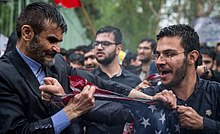Anti-American sentiment in Iran

| Part of a series on |
| Conservatism in Iran |
|---|
 |
Ayatollah Khomeini anti-Americanism was little more than a way to distinguish between domestic supporters and detractors, and even the phrase "Great Satan"[6] which has previously been associated with anti-Americanism, appears to now signify either the United States or the United Kingdom.[7][8]
Some studies show that anti-Americanism in Iran is related to support for political Islam.[9] US attempts to cripple Iran's economy have also significantly made Anti-American sentiment more common. Students from Tehran have been documented saying about US sanctions: “The more they push, the more it will lead to a rise in anti-Americanism.” and "It’s just a vicious circle."[10][11]
See also
- Anti-American sentiment
- Anti-Israeli sentiment
- Death to America
References
- ^ Robert Tait, 'America wants Iran to be dependent on it and Iranians don't want that', 2 February 2006, The Guardian.
- ISBN 978-0-313-32486-4.
- ^ Tamim Ansary (2009) Destiny Disrupted: A History of the World Through Islamic Eyes: 334
- ISBN 978-1-57607-919-5.
- ISBN 978-0-275-99742-7.
- ^ Sanger, David E.: "Bombs Away?", Upfront, The New York Times, 16
- ^ Johnson, Boris (22 June 2009). "What has Ayatollah Khamenei of Iran got against little old Britain?". The Daily Telegraph. Londo.
- ^ "World News » UK is Tehran's 'Great Satan'". Gulf Daily News. 25 June 2009. Retrieved 11 May 2012.
- .
- ^ "Iran sanctions stoke anti-US sentiment".
- ^ "US Economic Sanctions Harm Iranians' Right to Health".
